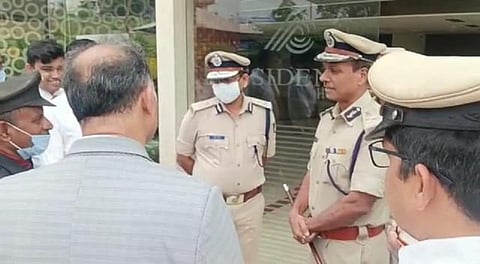We’ll be busy in coming months, but will manage: ADGP Alok Kumar
The recent killings of Masood B, Praveen Nettaru and Mohammed Fazil between July 19 and 28 in coastal Karnataka followed by violence in Shivamogga on August 15 over installation of posters of Veer Savarkar and Tipu Sultan have scarred the communal fabric in the State. The police have been under tremendous pressure to detect the cases post haste and maintain law and order in a highly charged and polarised atmosphere.
“Policing has become a challenge. Instead of focussing on public-centric schemes and service delivery, our energies are diverted to maintaining law and order. We will have our hands full in the coming months, but we will rise to the occasion,” said Additional Director General of Police, Law & Order, Alok Kumar in an exclusive interview with The New Sinday Express. Excerpts:
With the Assembly elections eight months away, are the police well equipped to deal with the challenges ahead given the past experiences of growing intolerance and mutual distrust among people?
The police have been busy firefighting communal and law and order issues that had the potential to escalate further. For every single incident of violence and arson there are at least five to six incidents, which could have flared up but were nipped in the bud because of our timely efforts.
The public doesn’t come to know about them. It is a challenge to maintain peace and harmony where there is trust deficit. Maintaining law and order is the top priority of the government and the police have been entrusted with the key responsibility. In a democracy, people enjoy the right to protest peacefully. But today, there are different perspectives, which lead to action and further chain of reactions, some of which turn violent. This makes the job of the police difficult.
How is the ground situation in coastal Karnataka and Shivamogga now?
Coastal Karnataka and Shivamogga have turned into hotspots. We call community leaders for peace talks and they do come but the undercurrents are strong. As Additional Director General of Police, Law & Order, I know the situation on the ground and the amount of work police are putting in to maintain peace. We need to take fair, firm and fast action, especially in a communal situation. We must act fast and as per law. Our responses have to be quick. There cannot be any shortcuts.
There were three murders in the coastal Karnataka region in a span of 10 days. What kind of pressure were you and the unit officers under while handling the situation?
It was a highly charged atmosphere after the murder of Praveen Nettaru in Bellare. Our first priority was to bring back law and order in the region. Handling the processions, protests, Praveen’s cremation and VIP visits were big challenges. The media pressure was unduly high on us with unverified stories circulating and further vitiating the already fragile atmosphere. We got an early breakthrough. The police arrested some people but the three main accused were still at large.
After 17 days, on August 11, we finally got the trio - Shiyabuddin, Riyaz and Basheer from Talpady. Thanks to the government support, though they had handed the case to the National Investigation Agency, we arrested all the accused before handing over the case to the Central agency. Fazil murder had created a pressure cooker like situation for the police. I was with the chief minister in Bellare, who was on his way to the airport, when we got the news. I was shocked. It was most unexpected. But due to the efforts of local police we managed to arrest the accused in no time.
Will confidence-building measures and proactive policing help in containing further violence?
We are continuously on the job. People still have faith in the police. We hold regular peace meetings with community leaders in sensitive areas. We are also engaging with the youth in Belagavi, Hubballi-Dharwad, coastal Karnataka and Shivamogga, trying to motivate them in taking a positive role in social issues, traffic management, nation building and joining the mainstream.
Even if we succeed 5-10 per cent in motivating them, we can be hopeful of a positive change. We must keep up our communication with the youth and give them direction. We are also in talks with political parties and leaders to help construct a conducive ecosystem. The police are trying their best to minimise the gap.

